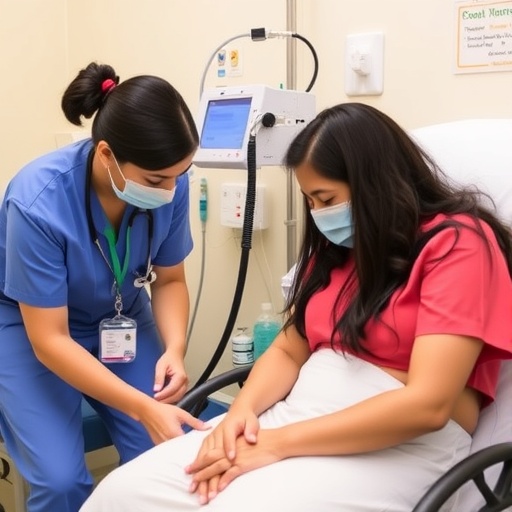In a groundbreaking randomized clinical trial recently presented at the American Society of Nephrology Kidney Week 2025 meeting, researchers have unveiled a culturally tailored intervention that engages community health workers to tackle critical challenges faced by Hispanic and Latino patients undergoing hemodialysis for kidney failure. This innovative approach demonstrated a modest yet significant reduction in interdialytic weight gain, alongside improvements in dialysis adherence and patient activation, marking a promising advance in the management of hemodialysis-dependent kidney failure within this underserved demographic.
Hemodialysis-dependent kidney failure presents a formidable health challenge, necessitating a highly regimented treatment schedule that profoundly affects patient quality of life. Among Hispanic and Latino populations, barriers such as cultural differences, language obstacles, socioeconomic factors, and healthcare access disparities often hamper adherence to prescribed dialysis regimens. Addressing such complex obstacles demands interventions tailored to the cultural contexts and specific needs of these communities.
The intervention studied was led by community health workers—trusted individuals embedded within the community—who provided culturally sensitive guidance and support. These health workers acted as liaisons, bridging gaps between patients and healthcare systems, facilitating understanding of treatment importance, and fostering adherence through education grounded in cultural relevance. This method aligns with growing evidence underscoring the efficacy of community-based participatory approaches in managing chronic diseases.
Interdialytic weight gain—the increase in body weight between dialysis sessions primarily due to fluid retention—is a critical clinical parameter in hemodialysis patients. Excessive interdialytic weight gain can exacerbate cardiovascular complications and adversely affect overall survival. By demonstrating a modest reduction in this parameter, the study suggests that culturally attuned interventions can influence patient behaviors impacting fluid intake and retention, an outcome previously elusive in standard care models.
Additionally, patient activation—a measure of patients’ knowledge, skills, confidence, and willingness to manage their health—showed improvement in intervention participants. Enhanced patient activation correlates with better health outcomes, including adherence to therapies, self-management practices, and reduced hospitalization rates. The study’s findings highlight the role of psychosocial support and culturally competent education as catalysts for empowering patients to take an active role in managing their kidney disease.
Dialysis adherence, encompassing both attendance at scheduled sessions and compliance with therapeutic protocols, improved notably in the intervention group. Considering that missed or shortened dialysis sessions are linked to increased morbidity and mortality, strategies that optimize adherence are vital. This trial’s success suggests that embedding cultural competency in care delivery frameworks may be instrumental in mitigating adherence disparities prevalent among minority groups.
The trial employed rigorous randomization and statistical methodologies to minimize bias, ensuring that the observed effects can be attributed with confidence to the community health worker intervention rather than confounding variables. Statistical significance bolsters the clinical relevance of the findings, fostering optimism about scalability and adaptation of this model to similar populations facing chronic disease burdens.
The tailored educational content delivered by community health workers featured linguistic adaptations, incorporation of cultural beliefs surrounding illness and treatment, and practical advice fitting patients’ socioeconomic realities. Such comprehensive customization contrasts with one-size-fits-all education often provided in dialysis units, illuminating the profound impact of culturally sensitive communication on patient engagement.
The investigators, led by Dr. Lilia Cervantes from the University of Colorado Anschutz Medical Campus, emphasized that while the reductions in interdialytic weight gain were modest, even incremental improvements hold substantial promise given the complex, multifactorial challenges inherent in this population. The integration of community health workers represents an additional support layer that complements clinical care rather than replacing it.
Implementation of this culturally tailored intervention demands robust healthcare infrastructure support, including training of community health workers in cultural competence, chronic kidney disease management, and communication skills. Furthermore, fostering collaborations between nephrology providers and community organizations is pivotal to streamline resources and sustain intervention fidelity over time.
This study contributes to a growing body of literature advocating for health equity through culturally informed interventions, particularly as minority populations continue to experience disproportionate burdens of chronic illnesses like kidney failure. Addressing social determinants of health alongside clinical treatment paradigms emerges as a necessary frontier in nephrology care delivery.
Future research directions include long-term follow-up to assess the durability of intervention effects, exploration of cost-effectiveness, and potential expansion to other ethnic groups and chronic disease contexts. Moreover, qualitative analyses capturing patient and community health worker experiences could further refine intervention strategies and maximize impact.
In conclusion, this pioneering trial underscores the transformative potential of community health workers operating within culturally tailored frameworks to enhance hemodialysis outcomes among Hispanic and Latino patients. By bridging cultural divides and empowering patients, such interventions pave the way toward more equitable, patient-centered care models in nephrology and beyond.
Subject of Research: Culturally tailored community health worker intervention for improving dialysis outcomes among Hispanic and Latino patients with hemodialysis-dependent kidney failure.
Article Title: Not provided.
News Publication Date: Not provided.
Web References: DOI reference: 10.1001/jamainternmed.2025.5305
Keywords: Hemodialysis, Medical treatments, Renal failure, Clinical trials, Randomization, Weight gain, Ethnicity, Disease intervention, Patient monitoring, Internal medicine.




